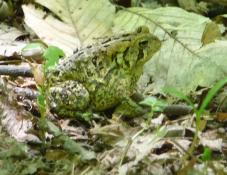Hazardous Creatures--Summer Hazards Part 2
- posted: Jun. 17, 2018
 Summer Hazards Part 2
Summer Hazards Part 2
It's getting hot out there! June 21 marks the official first day of summer, and while we are all ready to enjoy the warm weather, there are some things that could be harmful to our pets this time of year. Watch for these three potential hazards.
- Bee stings—Pets sometimes chase or snap at bees and wasps, or could accidentally get into a bees’ nest and be stung. A single sting is not usually problematic, but can be painful. If the stinger is still present, scrape it out with a credit card or other flat item, trying not to squeeze the stinger. If there is a welt or red, swollen area at the site of the sting, you can apply a small dab of cortisone cream and/or give antihistamines such as Benadryl can be given (call your vet for dosing information). If your pet is stung multiple times, has hives all over, seems to be having trouble breathing or collapses, take him to the vet. Anaphylactic reactions are rare, but they can occur.
- Snakebites—Snakebites are not common, but dogs and cats bitten by non-venomous snakes could develop an infection. Small puncture wounds can usually be identified at the site of the bite, typically on the limbs or face, and the area may be bruised, swollen and painful. Thankfully, we do not have many venomous snakes in Pennsylvania, but pets might encounter Copperheads or Timber Rattlers. If you suspect your pet has been bitten by a venomous snake, consider it an emergency. Rattlesnake bites tend to be much more serious than Copperhead bites but either can cause pain, swelling and infection, and, in some cases shock and respiratory distress. Dogs will be stabilized treated with IV fluids if needed and with antibiotics and anti-inflammatories. Anti-venom might be used if the bite is severe and if available, but, it can be expensive and it may cause an allergic reaction.
- Toads—while some toads such as the Marine Toad which can be found in Florida and South Texas exude a deadly toxin that causes heart problems, those found in our area tend to be less toxic. The common American Toad does emit a toxin on its skin when threatened which can cause drooling, vomiting, pawing at the mouth if ingested by dogs or cats. The secretions may also cause irritation to the eyes, but the poison is not fatal. Dogs in particular like to chase and pick up toads in their mouths. Cats are typically more discerning. If your dog may have encountered a toad, wash out his mouth or eyes with water and take him to the vet if he is vomiting or has severe irritation of the eyes.
Be sure to keep your pets safe from biting and stinging insects, snakes and toads this summer!
This blog brought to you by the Patton Veterinary Hospital serving Red Lion, York and the surrounding communities
http://www.vetstreet.com/our-pet-experts/beware-toads-that-can-poison-cats-and-dogs
Location
Patton Veterinary Hospital
425 E Broadway
Red Lion, PA 17356
